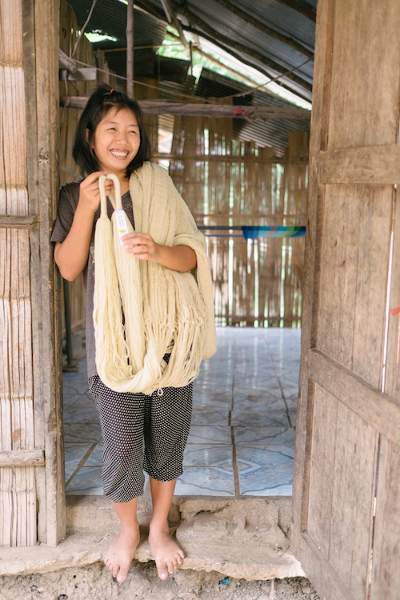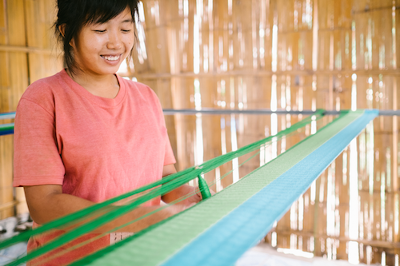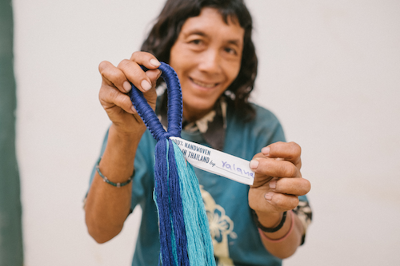Yellow Leaf Hammocks
Partner Description:
Yellow Leaf Hammocks is a mission-driven, market-based social enterprise dedicated to supporting high-wage weaving jobs for artisans in the hill tribe communities of rural northern Thailand.
By creating an international sales channel for high-margin, eco-luxury hammocks, Yellow Leaf is empowering marginalized hill tribes to alleviate poverty, advocate for social justice and combat environmental degradation.
Yellow Leaf’s weavers are among the 1.2 million hill tribe members in Thailand who exist on society’s lowest rung. Many are denied civil rights and social services as aliens in their own country. This makes them especially vulnerable to exploitation, including sex trafficking, child labor and indentured servitude. Most subsist in extreme poverty on less that US$1 a day.
The initial hammock weaving community was the Mlabri, also known as the Yellow Leaf people. Traditionally hunter-gatherers, their way of life was devastated in the mid-20th century by rapid deforestation and economic development. With no land ownership rights, no knowledge of agriculture or sources of income, the Mlabri were forced to work for neighboring tribes or for toxic slash-and-burn farming operations. Between the 1960s and 1990s, due to malnutrition and malaria, the Mlabri population shrunk to less than 300 people, their language becoming one of UNESCO’s “endangered languages.”
The Mlabri have now established a village, and through hammock weaving, their first economic initiative to generate results, they’ve gained recognition as citizens from the government. Hammock weaving has created high wages and flexible jobs, and weavers are trained and can manage their workflow according to family priorities. Expanding from the initial Mlabri community, artisans from the nearby Hmong village and surrounding rural areas are now also weaving hammocks. There’s even a waiting list to become a Yellow Leaf weaver!
Although weaving represents an excellent opportunity, it’s difficult to stabilize supply and demand. Hammock sales vary by season, and during slow seasons, weavers are still compelled to revert to destructive agricultural practices or seek employment elsewhere.

Yellow Leaf Hammocks are hand-woven and “insanely comfortable.”
Yellow Leaf Hammocks was created by Joe Demin, who first visited the villages in 2010 and saw the opportunity to build weaving into the foundation of a healthy micro-economy for the region. As “Chief Relaxation Officer” of Yellow Leaf, Demin is committed to generating international sales channels for these hammocks and has had success building a fanbase and working with major U.S. retailers like URBN and Trina Turk. As a boot-strapped start-up, Yellow Leaf has seen solid growth but continues to wrestle with stabilizing economic opportunities for weavers.
By creating a larger, more global distribution network, the enterprise can ensure more stable demand for high-wage weaving work. Hammock weaving provides a 650% increase in income over slash-and-burn agriculture, allowing each weaver to earn in a week what an entire family would earn from a month of back-breaking field labor. In their province, weavers can even earn as much as a college-educated teacher.
Kiva lenders’ funds are used to help artisans buy the raw materials they need to make hammocks. Additionally, the funds are used to expand Yellow Leaf’s distribution model to increase worldwide hammock sales.
A unique lending approach:
Kiva loans provide weavers with guaranteed work contracts and payment upon delivery of a finished product, but prior to the product being sold by Yellow Leaf Hammocks. Repayment terms allow enough time for Yellow Leaf Hammocks to sell the finished product, and use the sales revenue to pay back the loans.

Hammocks are weaved by Mlabri tribe members in northern Thailand.

Each hammock is signed by the weaver. This is a photo of Yalana with a hammock she made.
Images courtesy of Yellow Leaf Hammocks.
Repayment Performance on Kiva
| This Lending Partner | All Kiva Partners | ||
| Start Date On Kiva | Dec 19, 2012 | Oct 12, 2005 | |
|---|---|---|---|
| Total Loans | $1,242,575 | $2,061,712,330 | |
| Amount of raised Inactive loans | $66,100 | $379,125 | |
| Number of raised Inactive loans | 57 | 306 | |
| Amount of Paying Back Loans | $474,375 | $151,582,105 | |
| Number of Paying Back Loans | 275 | 180,570 | |
| Amount of Ended Loans | $702,100 | $1,864,456,995 | |
| Number of Ended Loans | 404 | 2,517,148 | |
| Delinquency Rate | 0.00% | 11.58% | |
| Amount in Arrears | $0 | $10,582,819 | |
| Outstanding Portfolio | $488,175 | $91,420,687 | |
| Number of Loans Delinquent | 0 | 34,389 | |
| Default Rate | 0.00% | 1.83% | |
| Amount of Ended Loans Defaulted | $0 | $34,072,925 | |
| Number of Ended Loans Defaulted | 0 | 91,307 | |
| Currency Exchange Loss Rate | 0.00% | 0.47% | |
| Amount of Currency Exchange Loss | $0 | $12,915,654 | |
| Refund Rate | 4.97% | 0.55% | |
| Amount of Refunded Loans | $61,800 | $11,263,070 | |
| Number of Refunded Loans | 36 | 9,868 |
Loan Characteristics On Kiva
| This Lending Partner | All Kiva Partners | ||
| Loans to Women Borrowers | 94.83% | 78.52% | |
|---|---|---|---|
| Average Loan Size | $1,690 | $393 | |
| Average Individual Loan Size | $1,690 | $585 | |
| Average Group Loan Size | $0 | $1,914 | |
| Average number of borrowers per group | 0 | 8.3 | |
| Average GDP per capita (PPP) in local country | $14,400 | $5,593 | |
| Average Loan Size / GDP per capita (PPP) | 11.73% | 7.03% | |
| Average Time to Fund a Loan | 18.06 days | 9.14 days | |
| Average Dollars Raised Per Day Per Loan | $93.57 | $43.02 | |
| Average Loan Term | 22.24 months | 11.5 months |
Journaling Performance on Kiva
| This Lending Partner | All Kiva Partners | ||
| Total Journals | 509 | 1,228,670 | |
|---|---|---|---|
| Journaling Rate | 69.80% | 41.93% | |
| Average Number of Comments Per Journal | 0.00 | 0.02 | |
| Average Number of Recommendations Per Journal | 0.00 | 0.55 |
Borrowing Cost Comparison (based on 2017 data)
| This Lending Partner | Median for MFI's in Country | All Kiva Partners | ||
| Average Cost to Borrower | 0% APR | N/A | 27.12% PY | |
|---|---|---|---|---|
| Profitability (return on assets) | -4.73% | N/A | -1.71% | |
| Average Loan Size (% of per capita income) | N/A | N/A | 0.00% |
Country Fast Facts
- Country:
- Thailand
- Capital:
- Bangkok
- Official Language:
- Thai (official) 90.7%, Burmese 1.3%, other 8%
- Population:
- 67,741,401
- Avg Annual Income:
- $14,400
- Labor Force:
- agriculture: 38.2%, industry: 13.6%, services: 48.2%
- Population Below Poverty Line:
- 12.60%
- Literacy Rate:
- 96.70%
- Infant Mortality Rate (per 1000):
- 9.86 deaths
- Life Expectancy:
- 74.01 years
Lending Partner Staff
Joe DeminJoe Demin
Jocelyn Maynes